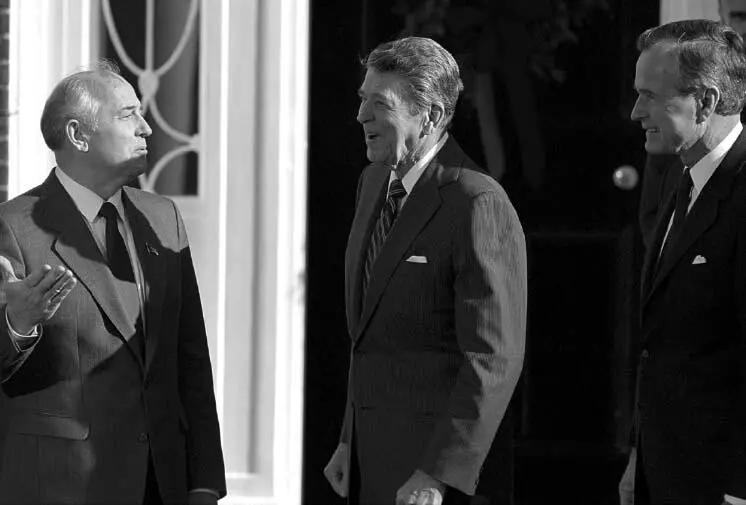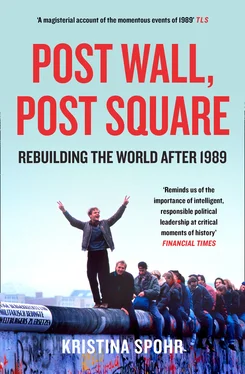Reagan asked Bush whether he wanted to add anything. The vice president chose to comment only on the symbolism of the photo. The two countries had come a long distance in the last three years, he said, going on to express the hope that in three years’ time there would be ‘another such picture with the same significance’. Bush said he wanted to build on what President Reagan had done, working with Gorbachev. Nothing that had been accomplished ought to be reversed. But he added that he would just need ‘a little time to review the issues’. Gorbachev wanted assurances that Bush would follow the path laid down by Reagan. Yet the vice president would not be drawn, using the need to construct a new Cabinet as his excuse. His theory, he said, was to ‘revitalise things by putting in new people’. He wanted to ‘formulate prudent national security policies’ but insisted that he didn’t want to ‘stall things’ or ‘set the clock back’. Bush was trying to keep the discussion loose and vague, using platitudes to keep his options open.[29]
There was, however, no let-up from the Soviet leader. His eyes firmly on the future, Gorbachev continued to probe Bush over lunch. He fished for substantive reactions to his UN speech. Shultz merely said the audience had been ‘very attentive’ and the final burst of applause was totally ‘genuine’. Bush, apart from commenting that Gorbachev seemed to have had ‘a full house, with every seat filled’, stayed silent. Gorbachev stressed that he was committed to all that he had said at the UN about cooperation between their countries.[30] While admitting that there were ‘real contradictions’ between them, particularly on regional issues, he insisted that Washington should not be suspicious of the Soviet Union. Turning directly to Bush, he said that it was ‘a good moment to make that point, with the vice president there’. The Soviet leader did a quick tour d’horizon of crisis hotspots around the world and then reprised his main theme about the cooperation he and the president had managed to build up. Glancing pointedly again at Bush as well as Reagan, he declared that ‘continuity was the name of the game’ and that ‘we should therefore be able to work together on all regional problems in a constructive way’. There was still no reaction from Bush, so Gorbachev tried to put him on the spot. ‘If the next president has studies under way, and has some remarks or suggestions on these issues I would like to hear from him.’ Bush again declined to be drawn. In the end Gorbachev simply joked that ‘the important thing was to make life easier for the next president’.[31]
Throughout the meeting, Bush remained buttoned up and stayed on the margins – sometimes, according to journalist Steven V. Roberts, edging ‘awkwardly into the picture’.

George H. W. Bush – The marginal man
Speaking to the press later that day in Washington, the vice president stuck to this non-committal tone: ‘I made clear to the general secretary that I certainly wanted to continue the progress that’s been made in the Reagan administration with the Soviets, and I also made clear that we needed some time, and he understood that.’[32]
*
George H. W. Bush was inaugurated on 20 January 1989 as forty-first president of the United States. He was the first serving vice president to be elected to the White House since Martin Van Buren in 1836. To many, in fact, George Bush had always seemed in the anteroom of history, doing useful jobs but on the edge of greatness: ambassador to the United Nations, US envoy to China and head of the CIA in the 1970s. And when he finally stuck out his neck in 1980, by running for the Republican nomination to the presidency, Bush had been outclassed by the telegenic Reagan – a product of Hollywood – whose financial policies Bush denigrated as ‘voodoo economics’.[33]
Reagan initially hoped to enlist former president Gerald Ford as his running mate, but after negotiations broke down less than twenty-four hours before the ticket was to be announced, he offered the position to Bush who, despite the bruising campaign for the nomination, immediately accepted. He was a loyalist and team player. His diary entries included comments such as ‘I am not going to be building my own constituency or doing things like background conferences to show that I am doing a good job’, and also ‘the president must know that he can have the vice president for him and he must not think that he has to look over his shoulder’.[34]
In Reagan’s second term, when Bush started to plan his own campaign, such loyalty was sometimes held against him – as evidence of his perpetual readiness to play second fiddle.[35] And when pressed to articulate his own agenda, he reportedly exclaimed ‘Oh, the vision thing!’ – a phrase often cited against him.[36] Did Bush have the backbone and self-confidence to take that final big step into the Oval Office?[37] He also lacked Reagan’s carefully crafted homespun eloquence and, although his speech accepting the Republican nomination in July 1988 won praise, it also contained the pledge ‘Read my lips: no new taxes.’ Bush slipped this in to appease the Republican right, to whom he looked unacceptably centrist compared with Reagan. In due course those words would come back to haunt him, but at the time they typified the thrust of his bid for the presidency, which concentrated on economic and social issues, rather than foreign affairs.[38] During a highly personalised, at times truly ugly, campaign the Republicans lambasted their Democratic opponent Michael Dukakis, former governor of Massachusetts, as an effete Harvard liberal who was weak on crime and profligate on spending. On 8 November 1988, number two finally became number one, chalking up a landslide victory by winning forty of the fifty states and 80% of the electoral college vote.[39]
Many people assumed that Bush would largely continue the policies of the outgoing administration, both at home and abroad, but the new president was determined not to be the stand-in for a Reagan third term. In fact the two men had never been particularly close and Bush privately held Reagan in fairly low esteem, as someone who was ‘kind of foolish and simplistic on many issues’. So the handover was really a ‘takeover’, albeit friendly. And, contrary to impressions during the campaign, foreign policy would not take a back seat. What’s more, in diplomacy Bush had a different style and agenda from his predecessor. It was here that the ‘real’ George Bush would step out of Reagan’s shadow.[40]
This fresh approach to foreign affairs was mapped out during the interregnum from November to January. Bush’s two key advisers were James A. Baker III, the new Secretary of State, and Brent Scowcroft, who became national security adviser. Their close relations with the president created a kind of constructive tension, as they acted out different roles in Bush’s diplomacy. Both men agreed that Washington had a strong hand to play in dealing with the Kremlin, but they differed significantly on how to use it.[41]
Baker was a long-time Texan sidekick (born in Houston in 1930, he was six years younger than Bush). The two had been close friends for over thirty years: Baker was almost like a younger brother. He had been a US Marine in his youth, then a successful attorney, before becoming a Washington insider. He went on to organise the election campaigns of Gerald Ford in 1976 and Ronald Reagan in 1984, and served right through Reagan’s two terms as White House chief of staff and then Treasury Secretary. In the view of Dennis Ross, a Washington veteran who was appointed director of the State Department policy planning staff, Baker was a superb instinctive negotiator, with a natural flair for dealing with people and a rare talent for identifying priorities. As regards the Soviet Union, Baker favoured continued and intensive diplomatic engagement. He wanted to test Gorbachev’s sincerity and encourage the Soviet leader into further reforms at home and abroad.[42]
Читать дальше













